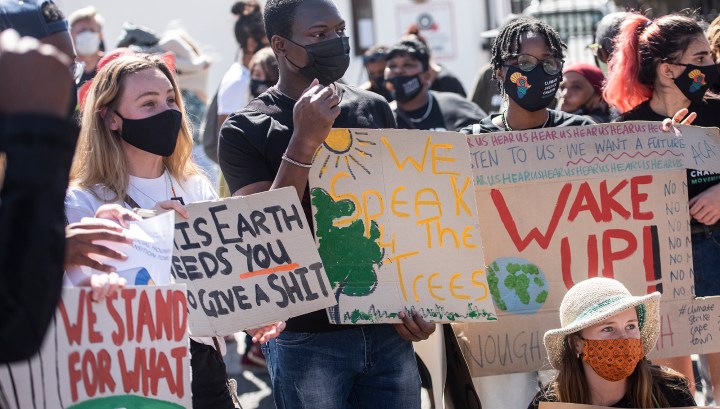CLIMATE & DEMOCRACY
Five million deaths a year and rising — what are you doing to save my f*** life?

‘It is a grave error to imagine that the world is not preparing for the disrupted planet of the future. It’s just that it’s not preparing by taking mitigatory measures or by reducing emissions: instead, it is preparing for a new geopolitical struggle for dominance.’ — Amitav Ghosh, ‘The Nutmeg’s Curse’ 2021.
In the early 1980s, US playwright Larry Kramer penned an article he furiously titled “What are you doing to save my fucking life?” Kramer was writing on behalf of gay men like himself who were dying of Acquired Immune Deficiency Syndrome (Aids) in growing numbers. Kramer’s ire was primarily directed at the US government, clinical researchers and the big pharmaceutical companies that manufacture medicines.
But it was also aimed at other Aids activists who Kramer condemned for being quiescent and captured.
Anger can be life-saving energy and it took the unfiltered anger of activists like Kramer, who died in 2020, to bring into being organisations like Act-Up (the Aids Coalition to Unleash Power) and catalyse a political movement around Aids. As the epidemic spread, so did activist organisations and, over the next 15 years, Aids activism spread to developing countries, inspiring activists and organisations including the Treatment Action Campaign (TAC), which I helped found in faraway South Africa in 1998.
With hindsight, we can see how targeted anger helped shatter the inertia and complacency around HIV/Aids; it shattered a status quo that would otherwise have allowed queers and poor black people to die, if they would only have stayed quiet about it. By 2022 savvy activism has contributed to saving 50 million lives by compelling the development of political will by governments and the United Nations. Activism also put Big Pharma under sufficient pressure to make their drugs affordable to poor people in developing countries, forcing the funding and rollout of antiretroviral treatment programmes even to the most discarded populations.
Tragedy in KZN as floods cause devastation, mostly for the poor in informal settlements
Today, in the face of the climate catastrophe, people in developing countries and people of colour in rich countries, those who bear the brunt of inequality (as we have seen during the Covid-19 pandemic), might well be demanding the same answer about global heating. Let’s say it again:
“What are you doing to save our fucking lives?”
This is not a rude or hysterical question. It’s not an alarmist plea for protection against a theoretical future threat.
It’s a now question.
In 2018 alone, according to the Internal Displacement Monitoring Centre (IDMC), 17.2 million people in 144 countries were internally displaced due to natural disasters. In the decade between 2008 and 2018, says the IDMC, climate change forced the migration of 265 million people.
‘Climate refugees’, to put it impolitely.
By 2021 it was calculated that climate change was already causing five million excess deaths a year. The vast majority of these deaths occur in developing countries, where poor people continue to die prematurely of the things they usually die of: except there’s a new determinant in town — climate change.
And, as the latest (April 2022) IPCC report shows, inaction means it’s only going to get worse. And worse.
But because these excess deaths are out of sight, and rarely attributed to climate change, they are kept out of the media and so mostly out of mind of the world’s elites. Western governments and the multilateral institutions of the UN that they have captured have yet to develop a conscience over the untold harm their carbon emissions are causing.
And on the side of the poor, there isn’t enough anger yet. So there isn’t enough action.
Political will to confront the climate crisis
In his 2021 book How to Spend a Trillion Dollars: The 10 Global Problems we can actually fix, Rowan Hooper states the obvious. He provides evidence to show there is no technical or economic barrier to a just energy transition: “The barrier is political, at every level.”
I say obvious because after 20 years of law-abiding activism, and in the face of incontrovertible science, by now it should be clear that, just as with the Aids epidemic, political will to seriously confront the climate crisis will not develop spontaneously from above. It will come only after a fight that will have to be driven by a historically unprecedented mobilisation of citizen activists from below.
Tragically though, at this moment the climate movement feels a bit stuck. There’s lots of outrage and theatre, but not enough movement-building. Why?
Throughout history, civil society has been a weather vane for emerging issues. This is because it is always closer to ground zero than governments. It senses issues before they become “ISSUES”; it uses activism to force them on to the agenda of the media and later government.
However, activism too is usually coloured by class and privilege. To be successful in changing the world it too has to go through its own evolution, and whether it does (or not) determines its impact.
In this sense, climate and environmental activism are no different from Aids activism.
Its modern incarnation began in the 1960s. Starting in the North (long before it was felt as an issue in developing countries) it was catalysed by exposés like Rachel Carson’s Silent Spring, and the first (largely overlooked) warnings from scientists about the dangers of global heating.
By the early 2000s, a revolution was under way. For example, in his book Blessed Unrest, environmentalist Paul Hawken claimed that by 2007 there were one to two million organisations across the globe working on environmental justice: optimistically, he called this “the largest social movement in history” claiming that it was “restoring Grace, Justice and Beauty to the world.”
But Hawken’s predictions underestimated the challenges. Environmental movements remained marginalised, stigmatised and (in parts of the world) persecuted until, in the past decade, a new radicalism erupted through campaigns like the Extinction Rebellion and youth movements like #FridaysForFuture inspired by Greta Thunberg.
At every stage, activists have sought to inject urgency, boldness and imagination into official processes and there’s no doubt they have had an impact. Incrementally, their influence has been felt in multilateral fora like the Earth Summit in Rio in 1992, leading to the UN Framework Convention on Climate Change, and later the Paris Agreement struck in 2015.
Most recently activists descended on COP26, held in Glasgow in November 2021, and organised the largest ever Global Day of Action for climate change with an estimated 100,000 people taking to the streets in Glasgow.
But it wasn’t enough. That is why, just like the Aids movement before it, the climate justice movement is now having to face up to its demons.
When the Aids movement began in the mid-1980s it too was located in developed countries among middle-class people who found it outrageous to contemplate dying in their twenties and thirties. Their campaigns were inspiring but Aids activism only acquired its political and moral power when it became a representative global movement.
That took more than a decade.
The same is happening with the climate crisis. Even though people in the global South are bearing the brunt of climate death and disruption, and are the least protected against future cyclones and storms (literally), in my part of the world activists are still having to fight for basic political freedoms, as well as for socioeconomic rights such as access to sufficient food, clean water, healthcare and basic education.
To the Global South the climate crisis is often hard to distinguish from the other depredations of authoritarianism, capitalism and corruption that are causing mass hunger, disease, violence and other miseries.
In South Africa, the most unequal country in the world according to the World Bank, mass unemployment (now 35.3%) together with inequalities in access to health, education and food are still front of mind. Or front of belly.
Only recently has there been a spurt in climate-related activism.
In the past six months, NGOs initiated successful public interest litigation to challenge #DeadlyAir pollution in the province of Mpumalanga (where coal-fired power stations have made the air pollution as bad as anywhere in the world); to halt Amazon’s attempts to build a new Africa HQ on a historic wetland in central Cape Town and against Shell’s efforts to conduct a seismic survey for fossil fuels off the West Coast of South Africa.

Activists and protestors stand along the M3 at the Shell garage in Newlands during a protest action against the 3D Seismic Survey commissioned By Shell along the West Coast on December 04, 2021 in Cape Town, South Africa. The move has sparked public outrage from the public and environmentalists who cite those seismic surveys have negative impact on marine life. (Photo by Gallo Images/Brenton Geach)
Organisations such as the Amadiba Crisis Committee, based in rural villages in a part of the Eastern Cape, who are fighting to stop the mining of ecologically sensitive areas are valorised as Davids in a fight against multinational Goliaths.
And so, belatedly, activism is catalysing government action on the climate crisis. In 2020 a Presidential Climate Commission was established; in 2021 South Africa adopted a more ambitious target for reducing its carbon emissions and a Climate Change Bill is expected to be passed by Parliament before the end of the year.
Yet the climate justice movement still only numbers several thousand people and has not taken root in trade unions, faith-based organisations or poor communities — even though these are the people most at risk.
The trillion-dollar question is how climate activism in SA and internationally, goes to scale and unleashes its power.
2020s or bust: Scaling up and building power
Up to now, climate activists have worked from the same activist toolbox as the Aids movement; using protest, civil disobedience and litigation; mobilising the media; shaming politicians and fossil-fuel tsars; building alliances with scientists and sympathetic governments from countries that have recognised their vulnerability, like Small Island States.
But despite these commendable efforts, it’s not enough.
The too-little-too-slowly responses to climate activism have exposed the extent to which Western governments in particular will promote the form but deny the fruits of participatory democracy. This exposes the extent to which Big Fossil Fuels have captured and corrupted politicians of all persuasions.
In the face of Aids activist pressure, Big Pharma eventually had to drop prices and profits on essential antiretroviral drugs. But Big Fossil Fuel is proving a more difficult foe than Big Pharma.
If the aim of advocacy is to shift policy and practice, then climate activists are fast discovering that there is some practice beyond their reach. Witness, for example, the gulf between US President Biden’s convenient rhetoric on climate change and his timid practice.
Even in a relatively new constitutional democracy like SA’s, where Big Fossil is less well embedded in political structures, and where there exist enormous opportunities for creating jobs and new economic pathways through renewable energy, the violence of inaction goes on.
Here Big Fossil is propped up by a faction in the governing ANC that is still committed to mining coal and other fossil fuels. At its worst, it has resorted to murder. At its mildest, it has tried to cloud issues by accusing environmental activists of having an “imperialist agenda” and representing “colonialism of a special type”.
This would be laughable if it wasn’t catastrophic because, in this standoff, civil society does not have the luxury of much time to refine its strategy and ‘theory of change’. In developed and developing countries alike, climate change is now triggering a vicious spiral that is a threat to even the attenuated democratic freedoms we have now.
What do I mean?
In July 2019 Phillip Alston, then the UN Special Rapporteur on Extreme Poverty and Human Rights, issued a report to the UN Human Rights Council on Poverty and Climate Change that joined the dots between climate catastrophe, human rights and the future of democracy.
Eschewing the use of expletives a la Kramer, Alston warned of states responding to climate change “by augmenting government powers and circumscribing some rights”; he predicted “immense and unprecedented challenges to governance”; and that “growing inequality and of even greater levels of deprivation among some groups will likely stimulate nationalist, xenophobic, racist and other responses”.
In parts of the world Alston’s hypothesis is already being borne out and — should we need further persuasion — Covid-19 has been a salutary lesson of how, in this age of anxiety and anger, governments respond to crises by limiting, not deepening, democratic rights.
These are reasons why I believe we are at a watershed moment for climate activism.
Temporarily knocked back by Covid-19 lockdowns and restrictions, civil society now needs to use democracy to its full potential. But side by side with this it will have to build its political power. It will have to reach and convince tens of millions, not tens of thousands. While keeping focus it will have to ally with class struggles for social justice and equality. It will have to move from mobilising fear to mobilising hope, popularising and persuading people of feasible alternatives and forcing political will.
It will be a struggle for and over power. This means that much like generations of freedom fighters against racism in South Africa and elsewhere, climate activists may have to take risks with their own freedom or risk losing both the possibility of climate justice and the bigger battle for democracy.
The stakes could not be higher. DM/OBP
This article is part of “Climate & Democracy”, a series from the global journalism collaboration Covering Climate Now.
Mark Heywood is a social justice activist and the editor of Maverick Citizen. He was a co-founder of the Treatment Action Campaign (TAC) and several other civil society organisations.





















 Become an Insider
Become an Insider
The reactions of governments to shut down global economies for one pandemic which turns out to be a bad dose of flu in the face of massive annual loss of life through inequality of hunger, health care, infrastructure, neoliberal extractive capitalism which threatens our very existence paints the very clear picture. If you cannot look at that picture yet, you will eventually be forced to see it because it will be everywhere you turn. But until we all wise up to rise up, things will keep on. Our own government seems to be the prime example of extractive economy, despite the science, despite the history, despite our constitution, and those who wish to destroy our natural resourses for the quick buck use the excuse of jobs for the poor. You dirty rotten scoundrels. Hamba !
So when last did you mention OVERPOPULATION as being one of the many causes of poverty, global warming and neo-left extractive dictatorships?
I suppose it would be fair that each person who cites overpopulation as .the cause of economic, environmental and social ills should begin with themselves. But usually, the blame is put on the poor masses who in fact live the very light footprint and who mostly deserve the earth.
You go first. I’ll follow.
Surely, it would be more practical (and more successful?) if each of us took specific action against climate change, rather than blasting Governments and business for not saving our souls for us?
Why should anybody else have any interest in saving my f@&£ing life? That responsibility lies with me and me alone. The original author, through his own actions, foreshortened his existence. Then he demanded that others take responsibility for his plight! To me that seems selfish and self centred?
Unless, and until, we take responsibility for our own circumstances and place on Earth, we are condemned to remain in our specific position